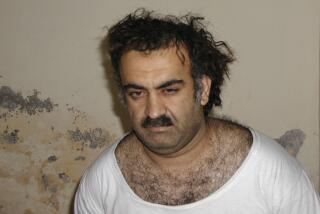Family of Sept. 11 Suspect Refuses to Aid in U.S. Probe
- Share via
PARIS — The brother and mother of accused Sept. 11 conspirator Zacarias Moussaoui said Monday that they were refusing to answer questions from a U.S. prosecutor because the investigation and impending trial of their relative could result in the death penalty.
Abd Samad Moussaoui, the brother of the 33-year-old Frenchman suspected of being the “20th hijacker” in the attacks, met Monday with a U.S. prosecutor and an FBI agent in Montpellier in southern France. But the 35-year-old teacher said he would not help U.S. officials because he believed that they are bent on executing his brother.
“I am not against the search for the truth or the punishment of the guilty, but I cannot be associated with the risk that my brother could be condemned to death,” he said in a telephone interview. “I know that the pain is still very, very strong for the Americans and that perhaps that people here do not realize that. But that is not a reason to be unjust.”
The suspect’s mother said in an interview that she and her daughter would refuse to attend a meeting with the prosecutor scheduled for today. And a French lawyer assisting attorneys in Virginia defending Zacarias Moussaoui criticized the French government for permitting U.S. investigators to collect evidence in a potential death penalty case in a country that has abolished capital punishment.
A Fundamental Philosophical Clash
The defense team’s effort to turn the case into an attack on the death penalty reflects a fundamental philosophical clash that could impede U.S.-European cooperation in terrorism-related cases. European political leaders, justice officials and the public are steadfastly opposed to the death penalty and highly critical of its use in the United States.
The Paris bar association, which represents more than 14,000 attorneys, issued a statement Monday calling on the French government to demand that U.S. authorities refrain from seeking the death penalty against Moussaoui, who will be tried in federal court in Virginia. U.S. prosecutors are expected to announce March 29 whether they will pursue capital punishment.
While expressing solidarity with the American victims of the attacks, Europeans also criticize potential military tribunals and the imprisonment of suspected terrorists at a U.S. naval base at Guantanamo Bay, Cuba.
The debate largely skirts questions of guilt or innocence. After the arrests of suspected members of an Al Qaeda cell in Madrid in November, Spanish media focused less on the evidence than on speculation that the prospect of the death penalty could scuttle a possible U.S. extradition bid.
Moussaoui’s French lawyer, Francois Roux, urged the Justice Ministry to suspend cooperation with the United States until it gets a promise that the death penalty will not be sought.
French anti-terrorism Judge Jean-Louis Bruguiere granted a request by U.S. investigators to conduct the interviews with Moussaoui’s relatives in France as permitted by a treaty. Bruguiere has opened an inquiry into the Moussaoui case to assist the U.S. prosecution.
The U.S. prosecutor will meet with French counter-terrorism officials in Paris and, according to sources, travel to Lyon to question other witnesses. Although officials would not divulge details, it is believed that investigators want to question people who know associates of Moussaoui.
Brother Undecided About Helping Defense
Moussaoui’s brother is a practicing Muslim, but he says he became disgusted with his sibling’s embrace of fundamentalism in the early 1990s. The elder brother said he had not seen Moussaoui since 1995. He said he had not decided whether to testify for the defense.
Moussaoui’s mother, Aicha, a Moroccan immigrant, said the evidence against her son did not merit the death penalty.
A terrorist would have had his immigration papers in order, she asserted; Moussaoui was arrested in August on immigration charges while attending flight school in Minnesota. She also cited Osama bin Laden’s statements in a video seized in Afghanistan that many of the 19 hijackers did not know the details of their mission.
“My son was not going to be among those people, because even those who died did not know they were going to die,” the mother said. “They thought they were going to take hostages. . . . They were victims, not kamikazes.”
U.S. authorities say they have a strong case. In addition to allegations of Moussaoui’s extensive activity in the Al Qaeda network documented by French counter-terrorism investigators, they allege that Moussaoui received money to finance his pilot studies from a key associate of the hijackers in Hamburg, Germany.
More to Read
Sign up for Essential California
The most important California stories and recommendations in your inbox every morning.
You may occasionally receive promotional content from the Los Angeles Times.













